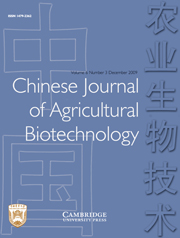No CrossRef data available.
Article contents
Influence of BCG dose and age of inoculated mice on immunoprotection against tuberculosis and expression of IFN-γ/IL-4
Published online by Cambridge University Press: 30 October 2009
Abstract
BalB/C neonate mice and adult BalB/C mice were vaccinated using BCG (Bacille Calmette–Guerin). The pathogenic growth characteristics of BCG in in vitro culture on spleen cells (SPC) were observed and changes in induced expression of IFN (interferon)-γ and IL (interleukin)-4 in SPC were detected using the ELISPOT assay. The results showed that a low dose of BCG (2×103 cfu) exerted 100% immunoprotection on 7-day-old neonate mice and a high dose of BCG (4×104 cfu) exerted 75% immunoprotection. A low dose of BCG (2×103 cfu) exerted 67% immunoprotection on 35-day-old mice. It is also shown that Th1-type cell immunity dominated by IFN-γ was enhanced significantly in the neonate mice injected with a low dose of BCG (2×103 cfu), and Th2-type cell immunity dominated by IL-4 was depressed at the same time. IFN-γ and IL-4 induced by a high dosage of BCG (4×104 cfu) in neonate mice were both increased. IFN-γ and IL-4 induced by a low dose of BCG (2×103 cfu) in 35-day-old mice were also increased. The results indicate that there exists a marked correlation between immunoprotection by BCG in mice and both the immunizing dose and age of the immune animals, which might be relevant to the changes induced by BCG on Th1- and Th2-type cell immunity.
Information
- Type
- Research Papers
- Information
- Copyright
- Copyright © China Agricultural University 2009

